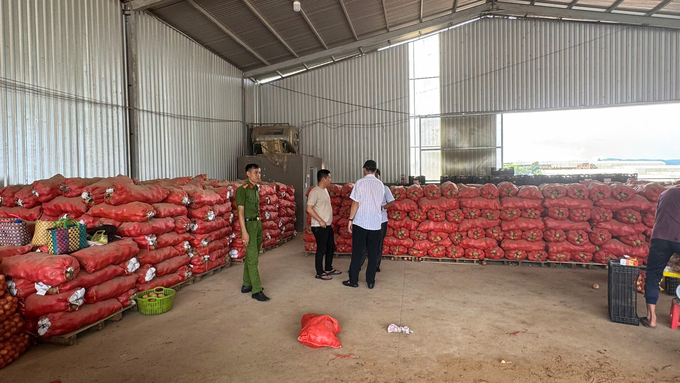November 27, 2025 | 13:06 GMT +7
November 27, 2025 | 13:06 GMT +7
Hotline: 0913.378.918
November 27, 2025 | 13:06 GMT +7
Hotline: 0913.378.918
Da Lat City's Department of Economics recently submitted a report to the city's People's Committee regarding the current state of imported potato trading within the city.
In 2018, the Da Lat City People's Committee requested relevant local agencies to conduct regular inspections, thereby identifying and taking decisive action against unauthorized trading activities, product and service fraud, and the sale of Chinese potatoes without lawful Vietnamese labeling. Consequently, the city's police confiscated contraband items, imposed administrative fines totaling 14 million VND, and destroyed more than one ton of Chinese potatoes mixed with Da Lat soil.

Da Lat City strengthened its efforts in reviewing, inspecting, detecting, and addressing illegal potato imports. Photo: V.T.
The management of imported potatoes in Da Lat City has increased in severity since searly 2018 due to increasingly strict control measures.
Subsequently, Da Lat City's Department of Economics has proposed various plans to the City People's Committee with the aim of further enhancing the control, detection, and handling of illegal potato imports and other agricultural products as a whole within the city.
The Department has recommended that the Da Lat Market Management Board continue to strengthen its market monitoring activity and oversee the local import and export processes.
The Department also suggested the ward- and commune-level People's Committees to enhance their supervision of local business communities, conduct in-depth inspections, or submit reports to the Da Lat City anti-smuggling task force (Department of Economics) for coordinated inspections and handling in accordance with regulations.
The Da Lat City Police are responsible for coordinating with the Department of Economics and the Da Lat - Lac Duong Sub-Department of Taxation in their inspection and enforcement efforts. Additionally, they have instructed specialized forces to closely monitor local trading activities and promptly address violations.
The Department of Economics has also suggested that the Da Lat City People's Committee request the Department of Agriculture and Rural Development, the Provincial Market Management Bureau, and district-level People's Committees to strengthen their control over agricultural products imported into the province. This initiative aims to prevent the import of low-quality, untraceable, or unlicensed agricultural products that can negatively impact the quality and reputation of Da Lat - Lam Dong agricultural brands.
In August 2024, Lam Dong Provincial Police inspected and reviewed several agricultural processing facilities in the districts of Don Duong and Duc Trong. Subsequently, they discovered that the facility owners were instructing workers to mix red soil into Chinese potatoes, and falsely labeling them as Da Lat potatoes for sale on the market.
Translated by Nguyen Hai Long

(VAN) After the institutional merger, Da Nang possesses significant forest-carbon reserves and is proactively engaging in the carbon market, creating a new revenue stream.

(VAN) An Giang strengthens communication against IUU fishing, increases inspections and sanctions, and is determined to remove the EC’s “yellow card” while developing a sustainable fisheries sector.

(VAN) As green transition becomes a global trajectory, Viet Nam’s biggest challenge is not only technology and models, but how to ensure that capital flows reach the right beneficiaries.

(VAN) The Ministry of Agriculture and Environment must spearhead the construction of green governance, spanning decision-making processes and investment standards to policy evaluation mechanisms.

(VAN) The Agriculture and Environment sector of Khanh Hoa has achieved numerous milestones over the past 80 years, contributing significantly to the goal of establishing the province as a centrally governed city by 2030.

(VAN) Viet Nam is entering the pivotal period of 2025-2030, moving toward the formulation of the Remote Sensing Law, which will establish a legal foundation for the development of national digital data.

(VAN) The agricultural sector is finalizing the strategic framework for emission reduction, setting the goal of sharply cutting methane and 403.7 million tons of CO2 equivalent and moving toward Net Zero by 2050.